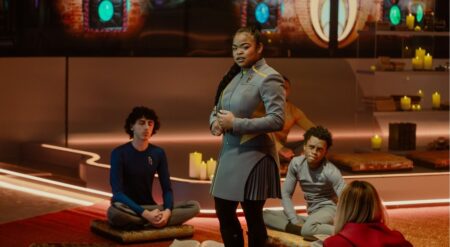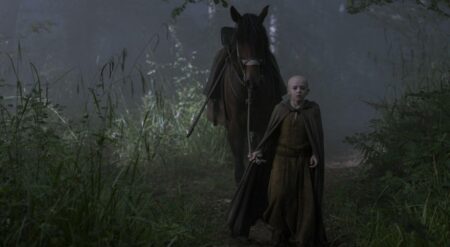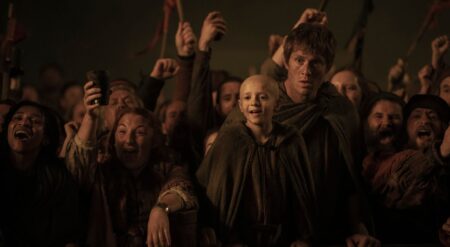
It’s time for season one of Warrior, Cinemax’s new Old West series based on the writings of Bruce Lee, to come to an end. In the season finale Warrior Episode 10, “If You’re Gonna Bow, Bow Low,” the series pays homage to one of Bruce Lee’s most iconic fights and sets up the dominoes ready to fall in season two. Now, while the episode offered closure, it also looked to the future of the show, having been greenlit for season two mid-way through the run.
Warrior Episode 10 starts with a look into the life of a coolie, a Chinese laborer, and for the first time, the show highlights the desperate and dangerous conditions that the majority of the Chinese migrants live in. It’s safe to say that although we have seen the show talk about both their living and working conditions and show us extreme racism, Warrior has mainly focused on the privileged part of Chinatown. Fine suits, alcohol, building a life although it may be through criminal means. We have seen the narrative from Chinese citizens that fall outside the norm for the majority of their community. But here, we see those who came to the United States with a dream to help their family but instead die here, with no way back home.
This scene from our past hits home, mainly because to an extent, a portion of this exploitation is still the life for many undocumented and migrant workers throughout the United States, mainly of Latin descent. Having heard stories of my grandfather watching his friends and family be sprayed with pesticide because pulling off the field would halt production when he was seven-years-old in the 1930s and knowing of the abuse faced by migrant workers in today’s agricultural industries, it hits me. But more importantly, it tells a story of that is crucial to American history, Chinese American history is our history, and in episode 10, Warrior doesn’t hold back in showing it to you.
In fact, through Chao (Hoon Lee), episode 10 highlights the little known fact of the exploitation of Chinese labor in Cuba, which was, in fact, a form of slavery. This has led to a large Sino-Cubano community and is not something widely spoken about in Latinx communities. As Chao recounts his attempt to leave to the United States he reveals that he the ship captain instead sailed to Cuba, selling him and others to work on the island. There is a lot to unpack in terms of the Chinese diaspora and is something better left to others of that experience to explain. As someone on the outside, the language is powerful and eye-opening.
Now thrown out of his Tong and rejected by his sister, Ah Sahm (Andrew Koji) has nowhere to go and instead has accepted his life as any other Chinese migrant. Waking at five in the morning to begin his shift, exhausted from work and still healing from the injuries he sustained in the last episode that left him near death, he is a shadow of who we once knew. Gone is the arrogant and assured fighter of the last nine episodes, instead, we see Ah Sahm who has accepted the lie that he will never be more in this city, that he doesn’t belong.
When the man who shares his sleeping area while he’s on his shift dies due to working related injuries, Ah Sahm begins to understand that accepting the mistreatment isn’t a way to live, not with his skill set at least. The most powerful words of the series begin to take root in Ah Sahm, “There are two paths for a warrior: die or get better.”
While Ah Sahm adjusts to his new life of disempowerment, his sister, and newly declared leader of the Long Zii, Mai Ling (Dianne Doan) battles for power amongst those she thought that she could control. With Bill’s (Kieran Bew) Fung Hai debt still outstanding, Officer Lee (Tom Weston-Jones) found himself in their crosshairs last episode. Beaten within an inch of his life and rendered comatose for weeks, Officer Lee’s attack spurs an increasing police presence in Chinatown, leading to the disrupting of Mai Ling’s first shipments after the treaty with the Hop Wei is signed.
Seeking to get it all back in control and believing that she can, Mai Ling confronts the leader of the Fung Hai, a man who had previously sworn his men and his Tong to her. Leading up to the confrontation, Mai Ling is dressed in all black, powerful and unwavering, she’s confident. Once again the costuming in Warrior is unmatched and is showcased in episode 10.
From her appearance alone we’re not supposed to question her identity as a leader, which makes the Fung Hai raising against her when she instructs them not to hurt the cops lest Chinatown come under more scrutiny, all the most shocking. Having killed and maneuvered her way into power, Mai Ling’s season ends uncertain, and not even Li Yong can help her.
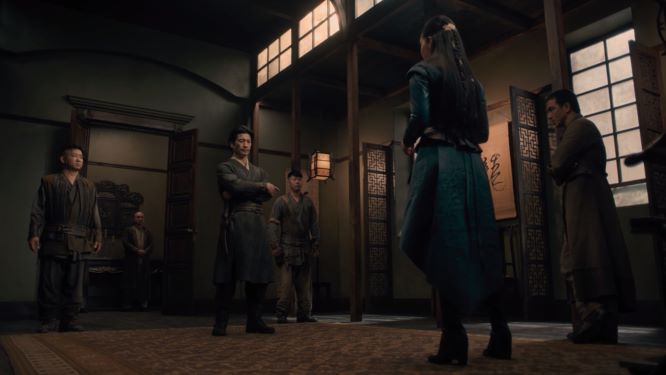
Warrior Episode 10 pushes us to see Mai Ling not only coming to heel with the Fung Hai, but we’re also reminded, like we are with Ah Sahm, that outside of Chinatown, to the Ducks, what the show calls white San Franciscans, she is nothing. Her status as a leader is nothing. She’s just another Chinese woman and it’s a rough blow to see one of my favorite characters of the season turned on her head.
While Mai Ling’s story ends with a question mark, Ah Sahm’s comes into focus, his hero’s journey almost complete. Now working for Penelope’s (Joanna Vanderham) father, a company that has replaced the Irish jobs with cheaper Chinese labor, he bears witness to an attack on the workers by the Irish, led by Leary (Dean Jagger). Methodically, the Irish assault the Chinese workers, lining them up and smashing their hands and dooming them to lives where they will never be able to buy their way back home.
It’s then, in the midst of racist violence that has been stoked by the politicians pitting the two groups of immigrants against each other, that Ah Sahm makes a choice. He chooses to get better and to finally fight for something bigger than him, even if he loses. Where episode nine’s tournament will stand as one of the best shot and choreographed 1v1 martial arts scene, this episode’s action is one of the best one versus many scenes.
In an homage to Bruce Lee’s Enter the Dragon, Ah Sahm utilizes both a bow-staff weapon, dual sticks, and other parts of his environment to outmatch the Irish. It’s truly a site to watch, with moving parts in the foreground, middle ground, and background. Stunt Coordinator Brett Chan has truly outdone himself, with every punch, kick, and environmental take-down perfectly place. While once again Koji’s ability to channel Lee’s fighting style while maintaining his own identity shines on the screen.
That being said, what I wasn’t ready for was the face of Leary. While we’ve seen Leary box a man, knocking him out cold, splitting his face, a level of brutality that rivals the hatchet men of the Tongs, he went against a normal man. As the leader of the Irish mob in San Francisco, we haven’t seen what he is really capable of, especially against a trained fighter.
When Ah Sahm and Leary go at it, it’s like the former is punching a mountain. Unmoved by Ah Sahm’s attacks, Leary is stone, taking the hits and delivering the damage back with hits of his own, keeping pace with the ridiculously fast Ah Sahm. With the two evenly matched, the fight ends as they run away from the incoming cops, with Leary calling him a slur and promising to find him, setting up a potential rematch for season two.
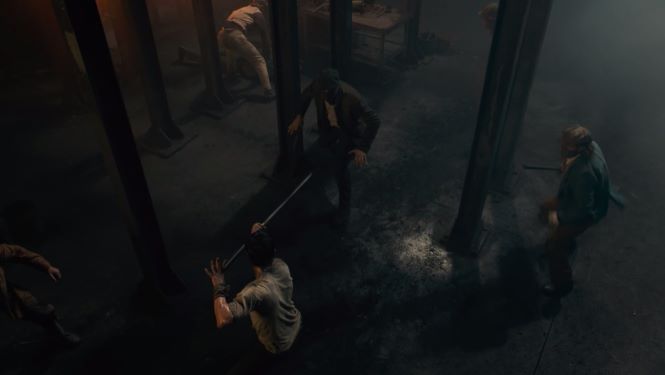
After fleeing the police who broke up the fight at the factory, Ah Sahm joins Ah Toy, ready to fight. Leaving his life as a Coolie behind and choosing to take Young Jun’s offer, which he previously denied, to join the Hop Wei one more time. Donning his Hop Wei suit and hatchet like a superhero costume, Ah Sahm is in his own. He has purpose. He has motive and is ready to walk into season two.
In addition to direction and stunt coordination, the music of Warrior episode 10 improves on the already amazing score of the series. From episode one, Warrior has used Spaghetti Westerns, hip hop, traditional Chinese instruments, and more to fuse a unique sound that works from beginning to end. With the big fight scored to the opening theme mixing with rock drums reminiscent of the Dropkick Murphys, until finally utilizing an iconic song from the past.
The final song of episode 10 is “Little Green Bag” by The George Baker Selection, iconically used in Reservoir Dogs’ opening credits, showing the suited criminals walking down the street. Similarly, the song is used to show Ah Sahm suiting up and finally scores the ending shot of the Hop Wei walking down the street, with Ah Sahm at the center, however, this rendition is sung in Cantonese and in all honesty is my favorite use of the song in media.
Overall, “If You’re Gonna Bow, Bow Low” is as perfect a season finale as you could hope for. It not only closes story arcs but weaves together storylines that have been separate up until this point. By bringing Ah Sahm into Penelope’s father’s factory, pitting against Leary, and turning Bill into an errand man for the Fung Hai, we see the clash that has been brewing beyond the Tong Wars. In addition to this, episode 10 sets up many paths for the next season, leaving me excited to see Ah Toy (Olivia Cheng) step out of the background and into the spotlight as she teams with Ah Sahm and needing to know if Mai Ling will regain her power.
From drama, the Old West, history, and martial arts, the first season of Warrior is one of the best first seasons to a show I have ever seen. It balances every element perfectly to tell its story, to focus the perspective of the Chinese immigrant and Chinese American experience. But beyond that, the finale is perfectly executed, as both a lead-in and an ending, “If You’re Gonna Bow, Bow Low” is perfection.
Warrior is available now on MAX (formerly HBO Max) and Netflix.
Warrior, Episode 10 - If You're Gonna Bow, Bow Low
-
Rating - 10/1010/10
TL;DR
From drama, the Old West, history, and martial arts, the first season of Warrior is one of the best first seasons to a show I have ever seen. It balances every element perfectly to tell its story, to focus the perspective of the Chinese immigrant and Chinese American experience. But beyond that, the finale is perfectly executed, as both a lead-in and an ending, “If You’re Gonna Bow, Bow Low” is perfection.


